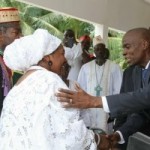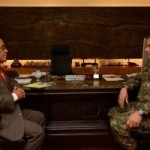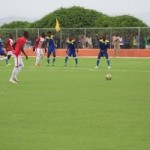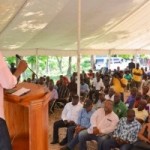KANDAHAR, Afghanistan — A suicide bomber detonated explosives hidden under his turban on Thursday after entering a mosque here where hundreds of people had gathered to pay respects to President Hamid Karzai’s half brother, who was assassinated on Tuesday.
The mosque attack killed at least three people besides the bomber and raised fears that Kandahar was entering a cycle of violence in the wake of the death of Mr. Karzai’s brother, Ahmed Wali Karzai, who was the most powerful man in the region.
The assassination and the mosque bombing, coming so close together, further unsettled people and increased their sense of vulnerability to attacks by the Taliban and other groups who might want to take advantage of the perceived lack of local leadership after Ahmed Wali Karzai’s death.
Little new emerged on Thursday about his killer, Sardar Muhammad, other than that he had run four security posts near the Karzai family’s ancestral village of Karz in the Dand district. Eleven men worked for him, and they were at Ahmed Wali Karzai’s house at the time of the killing, said the Kandahar police chief, Gen. Abdul Raziq. All of them have been detained, he said.
The Taliban neither accepted nor denied responsibility for the mosque attack, raising suspicions that they were behind it, but were uncomfortable that it had occurred in a place of worship.
President Karzai, who had visited Kandahar a day earlier for his half brother’s funeral and burial, had returned to the capital and was not in the mosque on Thursday, but many government officials from Kandahar and Kabul were there for the service. In recent years, Kandahar has been a center for violence, but many expected that security would be so tight in the days after Ahmed Wali Karzai’s death that there would be little risk in attending the memorial.
General Raziq said the bomber seated himself next to Hikmatullah Hikmat, the chief of the Kandahar Province religious council, and detonated the explosives. Mr. Hikmat and two others, including another senior imam, were killed, and 15 people were wounded, the Interior Ministry said.
The bomber might have entered the mosque with the clergymen, taking advantage of the cover that they provided because imams are not searched, said Haji Mohammed Ehsan, a provincial council member who was near the blast.
The chief of intelligence for Kandahar, Gen. Mohammed Naim Momin, condemned the attack and said it violated the Pashtun legal code known as Pashtunwali.
“We respect those people who wear turbans and did not check the turban as a sign of respect, but he betrayed this respect and hid explosives in his turban,” he said.
The attack came as the United Nations released a report that found the Taliban and other antigovernment groups were responsible for 80 percent of civilian casualties in Afghanistan during the first six months of the year. The report said that 1,462 civilians had been killed in that period, a 15 percent increase over the year before.
The United Nations special representative here, Staffan de Mistura, said that the United Nations has been in discussions with the Taliban about civilian casualties, but now wanted to see action to lessen them. “They will not like this report,” he said.
The deaths are increasingly being caused by improvised explosive devices similar to land mines. They are “simple to produce, easy to get materials for and completely indiscriminate,” Mr. Mistura said.
“The first person who puts his foot on one, it explodes,” he added.
Georgette Gagnon, the human rights director for the United Nations office here, said that two-thirds of the improvised explosive devices used in Afghanistan “are designed to be triggered by a weight of between 10 and 100 kilograms.”
“This is the weight of a human and, in many instances, that of a child,” she said.
With 368 deaths reported, May was the deadliest month for Afghan civilians since the United Nations began keeping such statistics in 2007, and June was hardly better, with 360 deaths.
The issue of civilian casualties erupted again after six people were killed on Wednesday night in a joint raid by Afghan and NATO-led security forces in Khost Province.
NATO said that all of the people killed were insurgents linked to the Haqqani network, a group based in Pakistan. The Afghan and NATO force was searching for an insurgent leader in a residential compound when it was attacked by a group firing automatic weapons, officials said.
The Afghan and allied fighters fired in return and killed the six people, including a “female insurgent.”
Civilians in the area protested on Thursday, placing the bodies onto Afghan rope beds and hoisting them on their shoulders as they walked from the village where the killings occurred. Gathering supporters as it went, the crowd swelled to nearly 2,000 people when it arrived at the provincial capitol building, where people demanded justice and placed the bodies in front of government offices as they shouted anti-American slogans.
Mubariz Mohammed Zadran, a spokesman for the provincial governor, said among the people killed on Wednesday night were a teacher, two students, a government employee and a woman. “We think the NATO forces acted based on wrong intelligence given to them by their local associates, who are usually trying to hit their tribal or political rivals by misleading NATO forces,” he said.
Local residents said that several of the people who were killed were watering their crops when the security forces arrived.
Afghans frequently tend their crops at night because the water, a scarce commodity here, has more time to soak into the soil before the day’s drying heat.
 Haïti – Politique : Moïse commémore les 226 ans de la cérémonie de Bois Caïman
Haïti – Politique : Moïse commémore les 226 ans de la cérémonie de Bois Caïman Haïti – RD : Les autorités militaires dominicaines appuient la formation d’une armée en Haïti
Haïti – RD : Les autorités militaires dominicaines appuient la formation d’une armée en Haïti Haïti – FLASH : Grande finale du Championnat Haïtien de Football Professionnel
Haïti – FLASH : Grande finale du Championnat Haïtien de Football Professionnel Haïti – Agriculture : Moïse promet 9 usines de transformation de riz dans l’Artibonite
Haïti – Agriculture : Moïse promet 9 usines de transformation de riz dans l’Artibonite
Leave a Reply